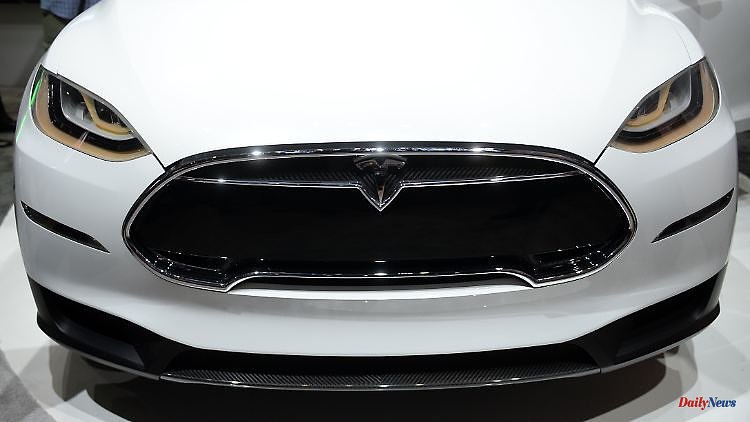Tesla looks back on a difficult year. Partially self-inflicted, the stock market value drops by up to 700 billion dollars. Group founder Musk is turning the price screw - in the name of growth. He could have set off an avalanche with it.
Tesla founder Elon Musk is known for three things: his penchant for giga-sizes, his autocratic leadership style, and his sometimes quirky sense of humor. So he entered the Twitter headquarters after the multi-billion dollar takeover for the premiere with a sink under his arm and the comment "Let that sink in!". As the first official act of the new boss, the entire top management was fired and 3700 of the 11,000 employees were sent home via tweet. The new Twitter owner asks the rest to accept "long working hours with high intensity" or to leave with a severance package.
Right from the start, Musk's special trademark was that all plans in his Tesla company empire had to be "giga": Factories, construction times, growth rates in Tesla sales, visionary projects, share price, private wealth. For ten years Tesla has been on the road to success without interruption. With his innovative, new electric car technology, including the gradual development of so-called gigafactories and his own charging infrastructure, Musk caught the long-established car manufacturers by surprise in all major automobile markets. At that time, nobody had marketable electric cars, equipped with high-performance batteries, networked and stuffed full of digital electronics for autonomous driving. There were no cars as mobile smartphones, today they are.
Tesla's high-end lineup grew, its stock price soared, Musk made his shareholders millionaires, himself the richest man in the world, and his Tesla company the first auto company worth more than $1 trillion. That was in 2021.
In 2022, the fairy tale of never-ending sales growth and limitless wealth accumulation came to an end for the first time. Tesla shares lost 70 percent of their value over the course of the year and became the biggest loser on Wall Street, Tesla's company value shrank by $700 billion to just over $345 billion. Musk's showpiece fell out of the list of the ten most valuable companies in the S
If one initially believed that Musk's Twitter escapades had caused the price slide, towards the end of 2022 sales problems were evident. Tesla sales began to falter for the first time, and the Shanghai gigafactory had to take production breaks. Musk's self-imposed sales target of 1.3 million electric cars by 2022 was in jeopardy.
The self-proclaimed "Techno-King of Tesla" had promised his shareholders annual sales growth of 50 percent. And Musk had always promised as a company goal to produce 20 million electric cars by 2030.
Tesla reported an unexpectedly high delivery of 405,278 cars in the fourth quarter of 2022 (but analysts had expected 430,000). The company was able to achieve its annual target with 1.31 million deliveries last year and thus increase its sales figures by 40 percent despite lockdowns in China and supply chain problems.
The truth is, however, that the market obviously didn't give up more sales without heavy discounts. Because Musk laid the foundation for higher sales increases in 2022 with the opening of two new plants in Austin, Texas, and in Grünheide, Brandenburg. Tesla could have built a total of two million electric cars at full capacity. The 1.31 million electric cars mentioned then became difficult.
And Musk begins to row: he offered his Twitter presidency in a user vote for return. The majority of them wanted that, but Musk has not yet withdrawn. Instead, he recently shut down coffee kitchens at Twitter headquarters and sold his employees' posh and wellness furniture there.
For Tesla, he pulled out the big marketing hammer called discount from the mothball box of sales. In November, Tesla reported record sales of 100,000 vehicles, which obviously did not all find their way to customers, but were "disposed of" in factory warehouses. Worldwide discount campaigns for warehouse vehicles followed.
Musk followed up with free refueling at Tesla charging stations, followed by price reductions in several stages, sometimes exceeding $10,000 in the main sales markets of China and the USA. Recently there was also a 10,000 euro discount in Europe. The result: a Tesla Model 3 is only 10,000 euros more expensive than an E-Fiat 500, one of the three best-selling electric cars in Germany.
And Tesla's price cut is putting pressure on all electric car manufacturers. In Germany, Tesla is now starting with the new 283 hp basic model of the Model 3 with rear-wheel drive and a small battery with a range of almost 500 kilometers at prices of 43,990 euros. Including the reduced state purchase subsidy from German taxpayers of 4,500 euros, the Tesla price for an entry-level model is just under the 40,000 euro mark.
A comparable BMW i4 eDrive 35 Gran Coupé costs at least 56,500 euros with its almost identical 210 kW/286 hp, comparable range and worse equipment. Due to the higher price, it only gets a tax bonus of 3000 euros and is therefore 13,000 euros more expensive than the Tesla in the lists.
The SUV is no different. Here Tesla has reduced the price for the popular Model Y to 44,890 euros. With the state subsidy, the price is just over 40,000 euros. A Tesla Model Y is no more expensive than a Skoda Enyaq base model. A Mercedes EQB with 140 kW/190 hp and front-wheel drive costs at least 58,000 euros - 13,000 euros more than the Tesla Model Y in the basic version with rear-wheel drive. The models from BMW, Audi, VW are also much more expensive: BMW iX from 55,000 euros, Audi Q4 electric crossover 51,900 euros, Volkswagen ID.4 46,335 euros.
Tesla's price cuts are already having an effect in China: buyers are also asking for discounts from other electric car manufacturers. Prices are not only coming under pressure in the premium segment. A ruinous price competition could be the result. The question remains: who wins?












